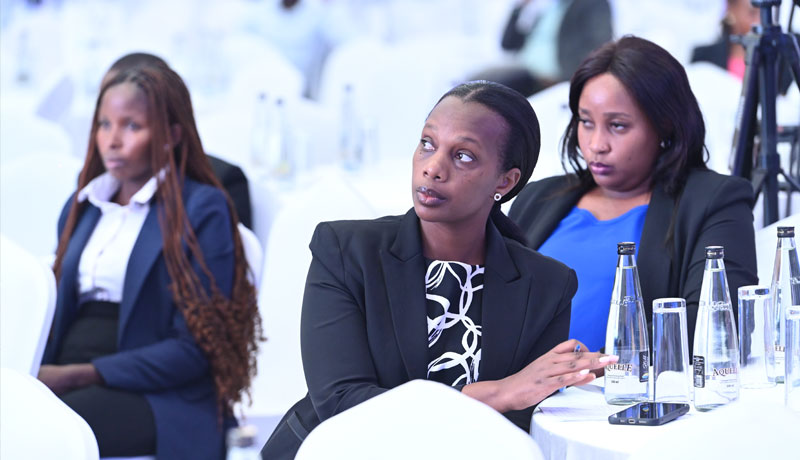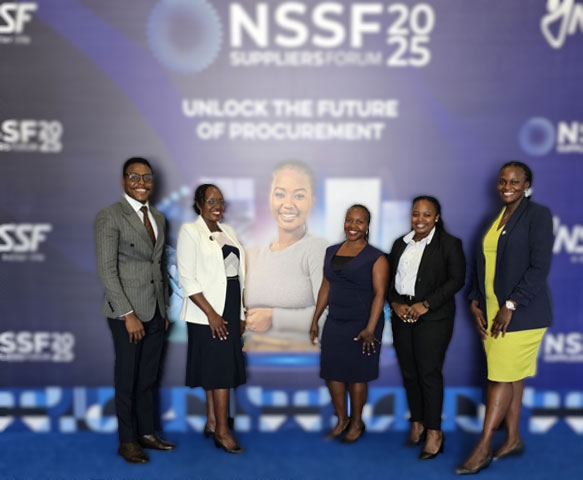Internal users and engagement within PDU

Our Strategy
Our suppliers


Dan Mugura, Head of Procurement and Disposal Unit
"By embedding inclusion into our procurement practices, we are not only meeting today’s needs but also powering local enterprise growth and empowering the next generation of Ugandan entrepreneurs in line with our 40-year legacy and Vision 2035."
Strategic contracting – Building partnerships for shared prosperity
Strategic contracting remains at the heart of NSSF’s transformation agenda and is a driver of efficiency, transparency, and inclusive growth. Through structured onboarding, transparent processes, and continuous engagement, we have welcomed new providers who now account for up to 15% of our total supplier base.
This year, we engaged over 190 unique providers, 97% of whom are local contractors actively contributing to Uganda’s domestic economy. Guided by the Public Procurement and Disposal of Public Assets (PPDA) Act, we applied reservation schemes to empower women, youth, and persons with disabilities (PWDs).
Over the past forty years, the Fund has built a vast network of suppliers for supplies, services and works, such as IT services, real estate development and facilities management. Our suppliers are valued business partners, and we believe, by working together, we can raise standards, drive sustainable practices, create shared value and build a better life for all.
Engaging with our suppliers provides valuable insight into their views and concerns, enabling us to respond appropriately.
These conversations not only strengthen relationships but also inform our strategy, policies, and ways of working, ensuring our approach remains relevant and effective.

Annual Suppliers Forum
To strengthen long-term partnerships, the Fund hosted the 9th Annual Suppliers Forum under the theme “Unlock the Future of Procurement.” The event attracted over 200 physical participants and 5k online attendees, and provided orientation on NSSF’s procurement strategy and sustainability agenda.
Ahead of the Forum, three supplier cohort sessions, covering works, Information Technology (IT), and air travel, were held to identify improvement areas and tailor engagement strategies.
Members of the PDU team at the 2025 Supplier Forum.
Procurement performance and achievements
Internal users rated procurement performance at 87%, while engagement levels within the Procurement and Disposal Unit (PDU) reached 93%. The PDU has adopted a strategic sourcing model that prioritises efficiency (90%), compliance with PPDA, Internal Audit and risk requirements (80.5%, 91%, and 91% respectively), and value-for-money. This approach, supported by comprehensive market analysis and effective negotiations, generated savings of UGX 8.6Bn and disposal proceeds of UGX 26.2M.
Efficient, compliant and risk-aware sourcing model
Generated savings and disposal proceeds
Key capital and strategic projects completed and underway
Major projects executed/ongoing include: completion works for Pension Towers, Temangalo Design and Build (D&B) at UGX 10.29Bn, Bwebajja Design Consultancy Contract at UGX 6.18Bn, Motor vehicles at UGX 6.12Bn, Enterprise Resource Planning system (ERP) at UGX.3.9Bn, Completion of Kyanja estate off-taker project, Virtual Storage Area Network (VSAN) alternative software license at UGX. 1.05Bn, Common User Facilities (CUFS) for Livelihood Communities at UGX 821M and New Security Information and Event Management (SIEM) System at UGX 635M.
Completed:
- Motor vehicles UGX 6.12Bn
- Enterprise Resource Planning system (ERP) UGX 3.9Bn
- Common User Facilities (CUFS) for Livelihood Communities UGX 821M
- New Security Information and Event Management (SIEM) System UGX 635M
- Virtual Storage Area Network (VSAN) alternative software license UGX 1.05Bn
Ongoing:
- Works for Pension Towers UFX 51.0Bn
- Temangalo Design and Build (D&B) UGX 10.29Bn
- Bwebajja Design Consultancy Contract UGX 6.18Bn
- Completion of Kyanja estate off-taker project UGX 4.3Bn
Driving sustainability through responsible procurement
Aligned with Environmental, Social, and Governance (ESG) principles, the Fund integrates “Green” procurement initiatives into its procurement and contract management processes. These initiatives promote environmental protection, social inclusion, and innovation by prioritising practices that reduce, reuse, and recycle materials.
Looking forward
In the year ahead, we will deepen innovation and data-driven decision-making in procurement, strengthen stakeholder collaboration and strategic partnerships, and expand capacity-building initiatives and procurement excellence forums. We will also embed ESG and social impact metrics more firmly within supplier evaluations.
By inducting and empowering local providers of goods and services, we are building NSSF’s resilience and driving inclusive growth. Our relationships have evolved from transactional engagements to strategic partnerships, focused on long-term impact and delivering a more prosperous Uganda.
